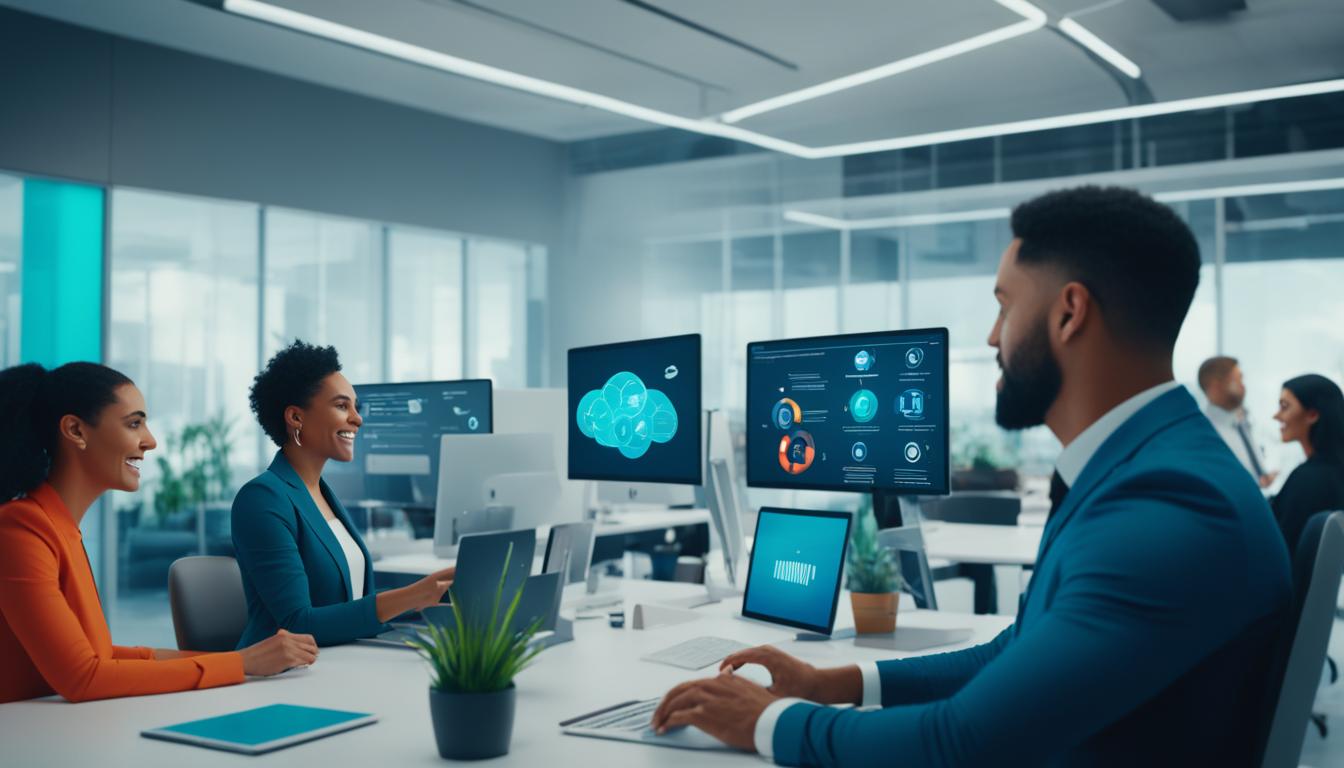Artificial Intelligence (AI) is revolutionizing the way we work, paving the way for a future where smart technology coexists harmoniously with human ingenuity. Contrary to popular belief, AI is not here to steal jobs. Instead, it offers a world of possibilities to those who embrace it to its fullest potential.
AI has the ability to emulate human-like responses and actions with the right prompts, streamlining workflows and increasing efficiency in various industries. It empowers individuals to assume multiple roles, opening up new avenues for creativity and specialization.
As we navigate the future of work, the successful integration of AI becomes crucial. The emergence of AI will undoubtedly reshape the job market, leading to both job displacements and opportunities. Understanding the impact of AI on the workforce and proactively adapting to these changes will be key to thriving in the evolving employment landscape.
Key Takeaways:
- AI enhances productivity and efficiency by streamlining workflows.
- Adapting and upgrading skills to effectively interact with AI models is essential for future career growth.
- AI empowers individuals to assume multiple roles, fostering creativity and specialization.
- The job market will be impacted by AI, with both displacements and the emergence of new roles.
- Reskilling and upskilling programs are necessary to bridge the skills gap in the AI-driven workplace.
The Impact of AI on the Job Market
In the era of digital transformation, AI has become a key driver of change in the workforce. As technology evolves, so does the job market. The World Economic Forum predicts that by 2025, 85 million jobs will be displaced by automation, but it also estimates that 97 million new roles will emerge to meet the demands of a digitally transformed world.
AI specialists, such as machine learning engineers and data scientists, are in high demand as organizations strive to harness the power of AI. These professionals possess the skills required to develop and deploy AI technologies effectively.
However, there is a significant skills gap that needs to be addressed. To keep pace with workforce technology trends, reskilling and upskilling programs are essential. Companies like Microsoft have already launched skills programs to equip individuals with the necessary AI skills, but collaboration between various stakeholders is crucial for broader adoption.
It’s important to recognize that AI’s impact on the job market isn’t limited to displacing jobs. As automation takes over routine tasks, it creates new opportunities in sectors like healthcare, manufacturing, and logistics. Jobs that require human creativity, critical thinking, and emotional intelligence are less likely to be automated.
The table below provides insights into the job displacement and creation potential of AI in various industries:
| Industry | Job Displacement | New Job Creation |
|---|---|---|
| Healthcare | 15% | 25% |
| Manufacturing | 20% | 30% |
| Logistics | 10% | 20% |
As we can see, while there will be job displacement, there will also be ample opportunities for new roles to emerge.
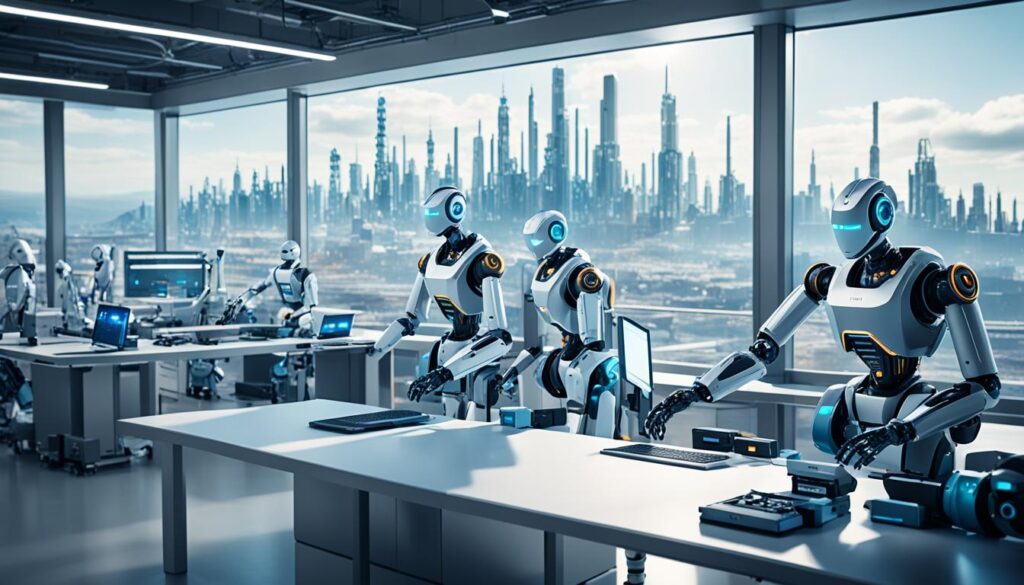
It is crucial to adapt to these changes by reskilling and upskilling the workforce to ensure a seamless transition. By embracing the potential of AI, individuals and organizations can take advantage of the digital transformation and thrive in the evolving job market.
The Importance of Lifelong Learning in the Age of AI
In the rapidly evolving landscape of workforce technology trends, it is crucial to recognize the future of employment and the significant role that artificial intelligence (AI) plays in the workplace. As AI continues to revolutionize industries, organizations must prioritize lifelong learning to adapt to the changing demands of the AI-driven future.
Educational institutions have a vital role to play in preparing individuals for the future of work. By integrating AI literacy into curricula, educational institutions can equip students with the necessary skills and knowledge to thrive in the AI-powered world. Understanding the fundamentals of AI and its implications fosters a sense of proficiency and dispels misconceptions and fears that may hinder adoption.
“Education is the most powerful weapon which you can use to change the world.” – Nelson Mandela
Businesses also have a responsibility to promote continuous learning among their workforce. Offering continuous learning opportunities, such as training programs and workshops, allows employees to upskill and reskill according to the demands of an AI-driven workplace. By embracing AI in the workplace, organizations unlock the potential for innovation, efficiency, and productivity.
Furthermore, governments can play a crucial role in ensuring workforce readiness for the AI era. Incentivizing worker training and development programs facilitates the acquisition of the necessary skills to thrive in an AI-driven economy. Collaboration between governments, businesses, and educational institutions is essential to align strategies and create a comprehensive plan for preparing the workforce.
The Benefits of Lifelong Learning
Lifelong learning not only prepares individuals for the future of employment but also opens up new opportunities for career growth and advancement. By staying abreast of the latest AI advancements and upskilling accordingly, individuals can position themselves as valuable assets in the job market. Lifelong learning also fosters adaptability, critical thinking, and problem-solving skills, which are highly sought-after in an ever-changing AI landscape.
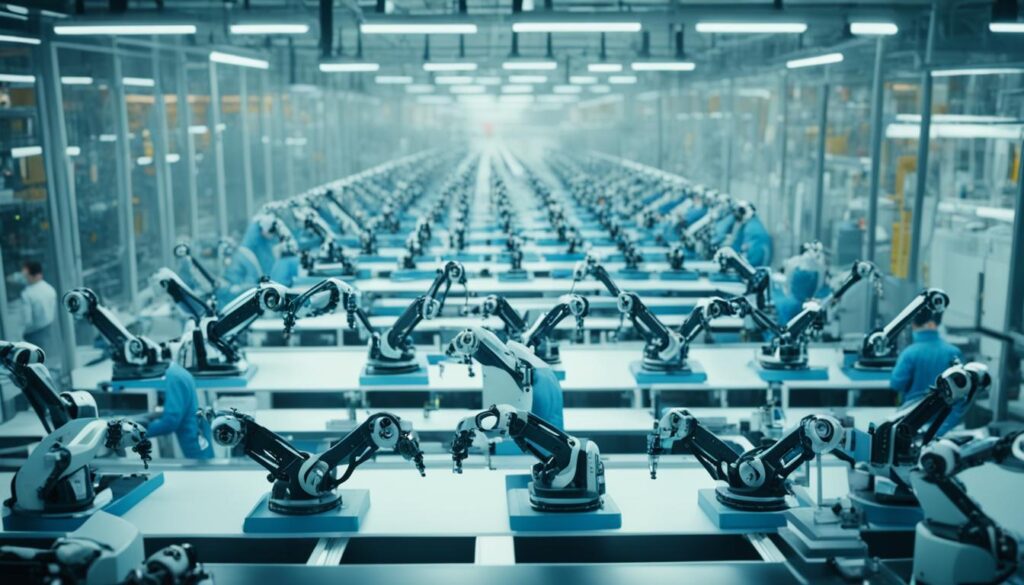
| Benefits of Lifelong Learning in the Age of AI | Examples |
|---|---|
| Enhanced Career Opportunities | Opportunities for promotions and leadership positions |
| Competitive Advantage | Increased employability and marketability |
| Adaptability | The ability to quickly adapt to technological advancements |
| Continuous Growth | Continual personal and professional development |
Lifelong learning, coupled with the integration of AI, presents an exciting opportunity for individuals to become multi-skilled professionals. By leveraging AI as a collaborative tool, individuals can enhance their creativity, problem-solving abilities, and efficiency in their chosen field of expertise.
In the age of AI, lifelong learning is not only advantageous but also essential for individuals, businesses, and society as a whole. It is through continuous learning and adaptability that we can embrace the future of employment and thrive in the AI-driven workplace.
The Rise of AI in the Modern Workplace
Artificial Intelligence (AI) has revolutionized numerous business functions, transforming mundane tasks and enabling complex problem-solving. The integration of AI-powered tools has proven to enhance productivity and streamline decision-making processes. This section explores the impact of AI on the modern workplace, highlighting its role in driving innovation, facilitating breakthroughs in product development, and enhancing the overall customer experience.
The collaboration between human creativity and AI’s analytical abilities is crucial in leveraging the full potential of this technology. As businesses continue to adapt to the digital age, professionals and organizations must embrace AI in order to remain competitive in the rapidly evolving market. By harnessing the power of AI, companies can gain a significant advantage and stay ahead of the curve in the ever-changing business landscape.
AI’s capabilities extend far beyond automating routine tasks. It has the potential to transform business operations, optimize resource allocation, and enhance efficiency across various sectors. The implementation of AI in workplace environments has yielded remarkable results, revolutionizing industries such as healthcare, manufacturing, and logistics.
Integrating AI into the workforce not only improves operational efficiency and accuracy but also empowers employees to focus on higher-value tasks that require human creativity and critical thinking. With AI handling repetitive and time-consuming activities, professionals can redirect their efforts towards more strategic and innovative endeavors, driving business growth and success.
“AI is not just about replacing jobs; it’s about augmenting human capabilities and enabling individuals to perform at their best.”
The Impact of AI in the Modern Workplace
| AI Benefits | AI Applications |
|---|---|
| Enhanced productivity and efficiency | Automated customer support |
| Streamlined decision-making processes | Intelligent data analytics |
| Improved accuracy and precision | Robotic process automation |
| Accelerated innovation and product development | Smart supply chain management |
| Optimized resource allocation | Cognitive assistance in healthcare |
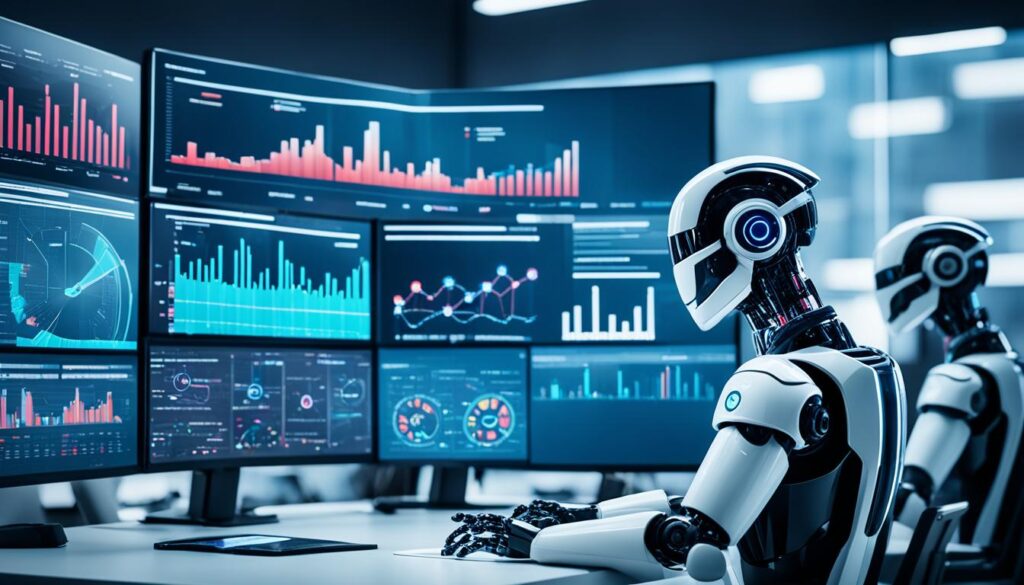
As demonstrated by the table above, the application of AI in the modern workplace yields a wide range of benefits, from enhanced productivity and streamlined decision-making to accelerated innovation and optimized resource allocation. Businesses across industries are embracing AI technologies to improve their operations, lower costs, and gain a competitive edge in the market.
In addition, AI has a significant impact on customer experience and satisfaction. Through intelligent data analytics and automated customer support, organizations can provide personalized and efficient services, resulting in higher customer retention rates and increased brand loyalty.
It is important to recognize that AI is not meant to replace human workers; rather, it complements and enhances their capabilities. By leveraging AI technologies, professionals can accomplish tasks more efficiently, allowing them to focus on higher-value responsibilities that require human ingenuity and problem-solving skills.
As AI continues to reshape the modern workplace, it is crucial for professionals and businesses to embrace this transformative technology. By staying informed about the latest advancements, investing in AI training, and fostering a culture of innovation, organizations can unlock the full potential of AI and drive sustainable growth in the digital era.
Preparing for the AI Revolution
Investing in AI training and tools is essential to navigate the future of employment in the era of digital transformation. As artificial intelligence continues to advance, professionals must equip themselves with the necessary skills and knowledge to stay relevant and competitive.
Understanding the ethical implications of AI is crucial. As AI technologies become more sophisticated, it becomes imperative to consider the potential impact on privacy, data security, and social equality. Being aware of these ethical considerations ensures responsible usage and implementation of AI in the workplace.
Fostering a culture of continuous learning is necessary for professionals to adapt and thrive in the rapidly changing landscape shaped by AI. Embracing ongoing education and staying informed about the latest advancements in AI technology are essential steps towards future-proofing one’s career.
Staying informed, adaptable, and ahead of the curve is critical for professionals in the age of AI. Actively seeking opportunities to upskill and reskill, exploring new AI-based tools and techniques, and being open to embracing change will position individuals for success in a digitally transformed job market.
Navigating the AI Landscape: A Collective Responsibility
As the future of employment continues to evolve in the era of digital transformation, businesses, government entities, and educational institutions share a collective responsibility in navigating the AI landscape. Collaboration and cooperation among these entities are essential for ensuring the preparedness of the workforce and harnessing the benefits that automation brings.
- Collaboration between governments, businesses, and educational institutions: Given the impact of automation in business and the workforce technology trends, a collaborative approach is necessary. Governments can create policies that incentivize worker training programs and promote the development of skills suited for the future job market. Businesses can partner with educational institutions to offer practical training opportunities and ensure that curricula align with the demands of the digital era.
- Policies that incentivize worker training and development: To address the challenges posed by automation, governments can put in place policies that support continuous learning and upskilling. By providing financial incentives and resources for individuals to acquire new skills, governments can mitigate the negative effects of AI job displacement and foster a more adaptable workforce.
- Reducing bias in the hiring process: AI systems have the potential to reduce bias in the hiring process by focusing on objective criteria and eliminating human biases. By leveraging AI algorithms, businesses can create fairer and more inclusive hiring practices, ensuring equal opportunities for all individuals.
- Conducting audits of AI systems: To maintain transparency, accountability, and ethical use of AI, businesses need to regularly audit their AI systems. Auditing helps identify any biases or flaws in the algorithms, ensuring that AI is deployed responsibly and in line with the values and objectives of the organization.
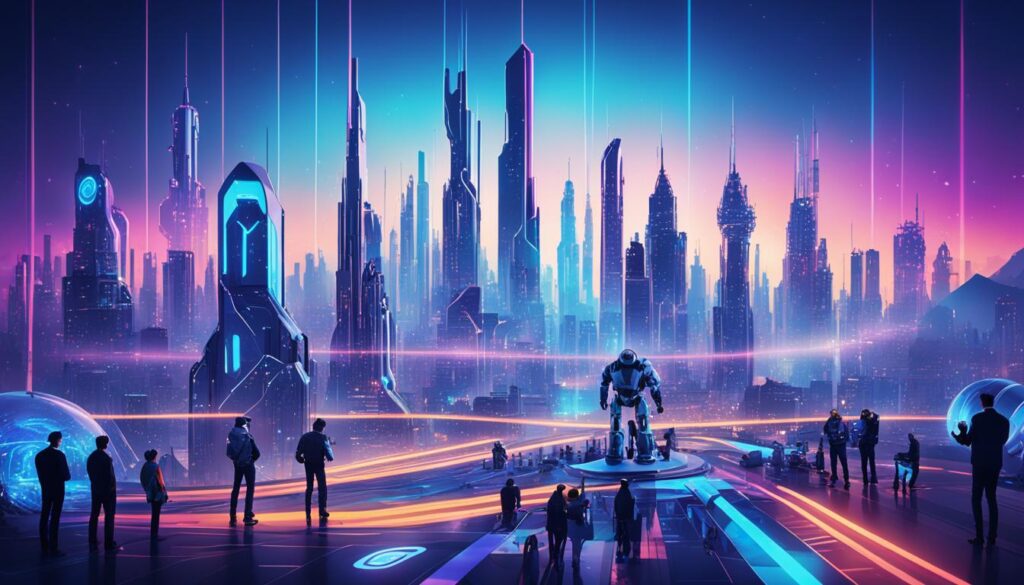
By adhering to these principles, governments, businesses, and educational institutions can collectively shape the future of employment in the age of automation. Together, they can create an ecosystem that embraces the advantages of AI while taking into consideration the well-being and potential of the workforce.
Conclusion
Artificial Intelligence (AI) is no longer a science-fiction dream, but a powerful tool that has the potential to shape the future of work. Integration of AI into business processes unlocks new levels of productivity and innovation, revolutionizing industries across the globe. Rather than being a threat to employment, AI proves to be an invaluable ally, empowering businesses and professionals to stay ahead of the curve in the age of digital transformation.
The future of work is undergoing a fundamental shift, with AI playing a pivotal role in driving this transformation. Companies that embrace AI technologies are well-positioned to optimize workflows, streamline decision-making processes, and enhance overall efficiency. By harnessing the power of AI, businesses can unlock new avenues for growth and specialization, leading to increased competitiveness in the marketplace.
For professionals, embracing AI is essential to future-proof their careers. As AI becomes more prevalent, individuals need to upgrade their skills to interact effectively with AI models. Lifelong learning and continuous skills development become imperative in this AI-driven landscape. By investing in AI training and staying informed about the latest advancements, professionals can navigate the AI revolution and seize new opportunities in the future of employment.
In conclusion, the integration of AI into the workplace is a game-changer. It is not only essential for businesses to stay competitive but also empowers individuals to redefine their roles and contribute to the ever-evolving workforce. By embracing AI, organizations and professionals can unlock new dimensions of productivity, innovation, and success in the digital era.
FAQ
Will AI lead to job displacement?
AI won’t steal jobs outright. Those who use it smartly will thrive. AI can emulate human-like responses and actions with the right prompts. AI streamlines workflows and increases efficiency.
How can individuals upgrade their skills to interact effectively with AI models?
Upgrading skills to effectively interact with AI models is crucial. AI empowers individuals to assume multiple roles. Embracing AI opens up new avenues for creativity and specialization.
How will AI impact the job market?
The World Economic Forum predicts 85 million jobs will be displaced by automation by 2025, but 97 million new roles will emerge. AI specialists like machine learning engineers and data scientists are in high demand. There is a skills gap that needs to be addressed through reskilling and upskilling.
Are educational institutions adapting to the AI-driven future?
Lifelong learning is crucial in the AI-driven future. Educational institutions must integrate AI literacy into curricula. Education can address misconceptions and fears about AI. Businesses should offer continuous learning opportunities. Governments can incentivize worker training and development.
How can businesses leverage AI in the workplace?
AI has transformed various business functions, from mundane tasks to complex problem-solving. AI-powered tools enhance productivity and streamline decision-making. AI drives innovation and breakthroughs in product development and customer experience. The collaboration between human creativity and AI’s analytical abilities is crucial. Professionals and businesses must embrace AI to stay competitive.
How can businesses and governments prepare for the AI revolution?
Investing in AI training and tools is essential. Understanding the ethical implications of AI is crucial. Fostering a culture of continuous learning is necessary. Professionals need to stay informed, adaptable, and ahead of the curve in AI technology. Collaboration between governments, businesses, and educational institutions is necessary for workforce preparedness. Policies can incentivize worker training and development. Reduction of bias in the hiring process is possible with AI. Businesses need to conduct audits of AI systems and prioritize transparency and accountability.
Is AI a threat to jobs or an ally?
AI is not a threat but an invaluable ally in the future of work. Integration of AI unlocks productivity and innovation. Embracing AI is essential for businesses and professionals. Stay ahead of the curve and harness the power of AI.

